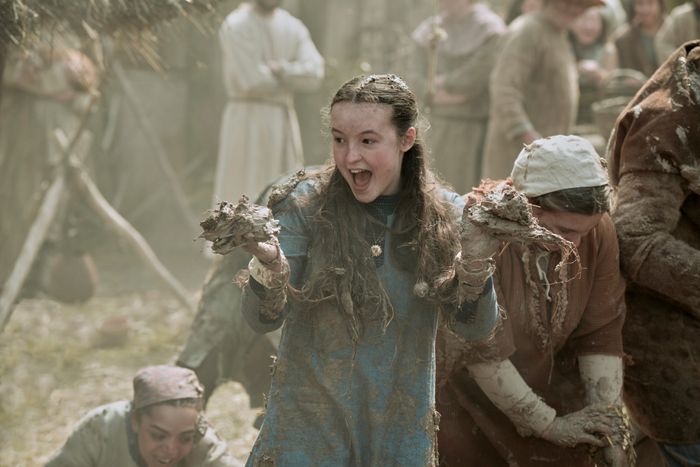
Catherine (Bella Ramsey) is a well-off young white woman who jostles against the confines of a patriarchal society while oblivious to how much better she has it than so many of the people around her. In other words, despite happening to live in 1290 England instead of 2010s Brooklyn, she’s very much a Lena Dunham heroine. The marvel of Catherine Called Birdy, which is going from a premiere at the Toronto International Film Festival to Prime Video on October 7, is just how well Dunham’s sensibility blends with the lighter touch of Karen Cushman’s beloved children’s novel about a teenager in the Middle Ages. Catherine Called Birdy is the second movie Dunham’s directed this year, and while it’s a more mainstream effort than the odd but undeniably interesting Sharp Stick, it doesn’t water down her voice. Instead, the self-lacerating, self-consumed filmmaker seems liberated by the act of adaptation, as though tempering her distinctive creative impulses gives her rein to make a movie that’s tender and more broadly crowd-pleasing, while still very much her own.
Catherine is the daughter of Lord Rollo (Andrew Scott) and Lady Aislinn (Billie Piper), whose domain includes the manor and village of Stonebridge. As the youngest child of a family that includes two sons — Edward (Archie Renaux), who Catherine deems “more fun than most monks,” and the “terrible” Robert (Dean-Charles Chapman) — she’s enjoyed a blissfully feral childhood of running wild with her pal Perkin (Michael Woolfitt), who tends to the goats, and visiting with her best friend Aelis (Isis Hainsworth), the daughter of a neighboring noble. Stonebridge is shown to be as bright and rambling as it is gross, with Catherine’s nursemaid chiding her charge about getting dirty after having been bathed a mere fortnight ago. But Catherine has now reached the age of 14, which is the 13th century equivalent of 25 in present day Greenpoint, and adult responsibilities have begun encroaching on her days, with her father deciding that the only way to solve his financial problems is to marry his only daughter off to someone wealthy. Catherine resists mightily, first by hiding evidence that she’s gotten her period in the floorboards of the outhouse, then by driving away every suitor with calculatedly off-putting behavior, a plan that ends up backfiring.
Ramsey, a wonderfully rambunctious presence who bulldozes her way over everyone she shares the screen with, is best known for playing the formidable Lyanna Mormont in Game of Thrones. There are ways in which Catherine Called Birdy feels like it’s intended to serve as a gentle rejoinder to that franchise, or to at least complicate the conversation around it. For all the hand-wringing surrounding the gruesome birth sequence in House of the Dragon, misogynistic brutality has always seemed like one of the fictional universe’s essential elements, part of an insistence that its crypto-European historical trappings be accompanied by some period-appropriate dehumanization. Catherine Called Birdy doesn’t skimp on those details either, but it also refuses to simply wallow in their cruelty. There’s a string of tiny graves behind the manor that mark the half-dozen stillbirths Aislinn has had in a row, and yet she gets pregnant again, despite being told it could cost her life. Still, the movie refuses to make Rollo, as careless and self-involved as he might be, the villain in that decision, stressing instead how loving the relationship between Catherine’s parents is, and how much they both, as products of the time, believe that this is just part of her duty as a wife.
Catherine, too, is a product of her time, and while her whirlwind emotions and mile-a-minute narration and obstinate dreams of running away make her feel more modern, her world and her future are actually very constrained. Catherine Called Birdy isn’t devoted to a sense of historical fidelity — Scott flounces around the manor in what looks like the medieval answer to a bathrobe and sweatpants — but it also isn’t one of those films, like the dismal Persuasion, that treats its period setting like nothing more than a costume party. Instead, its strives for a version of rebellion that doesn’t feel AirDropped in from the 21st century, with Catherine gradually coming to terms with the options that are actually available to her, while accepting how little empathy she’s shown to others in her life. Her casual slights — “You’re so lucky your father’s dead,” she tells Perkin, who responds that he’s in fact still very upset about that loss — provide some of the funnier moments in this ebullient film. The end, when it arrives, diverges from Cushman’s, and verges into something like wish fulfillment, though it’s hard to fault Dunham, who also wrote the screenplay, for that. Catherine’s such an endearing creation that it’s hard not to want something different for her, even if she herself couldn’t tell you what that should be.
More From Toronto
- The Knives Out Sequel Is Bigger and Better Than the Original
- Watch the Trailer for Sarah Polley’s ‘Women Talking’
- Are You Ready for This Year’s Incredibly Messy Best Actor Race?


